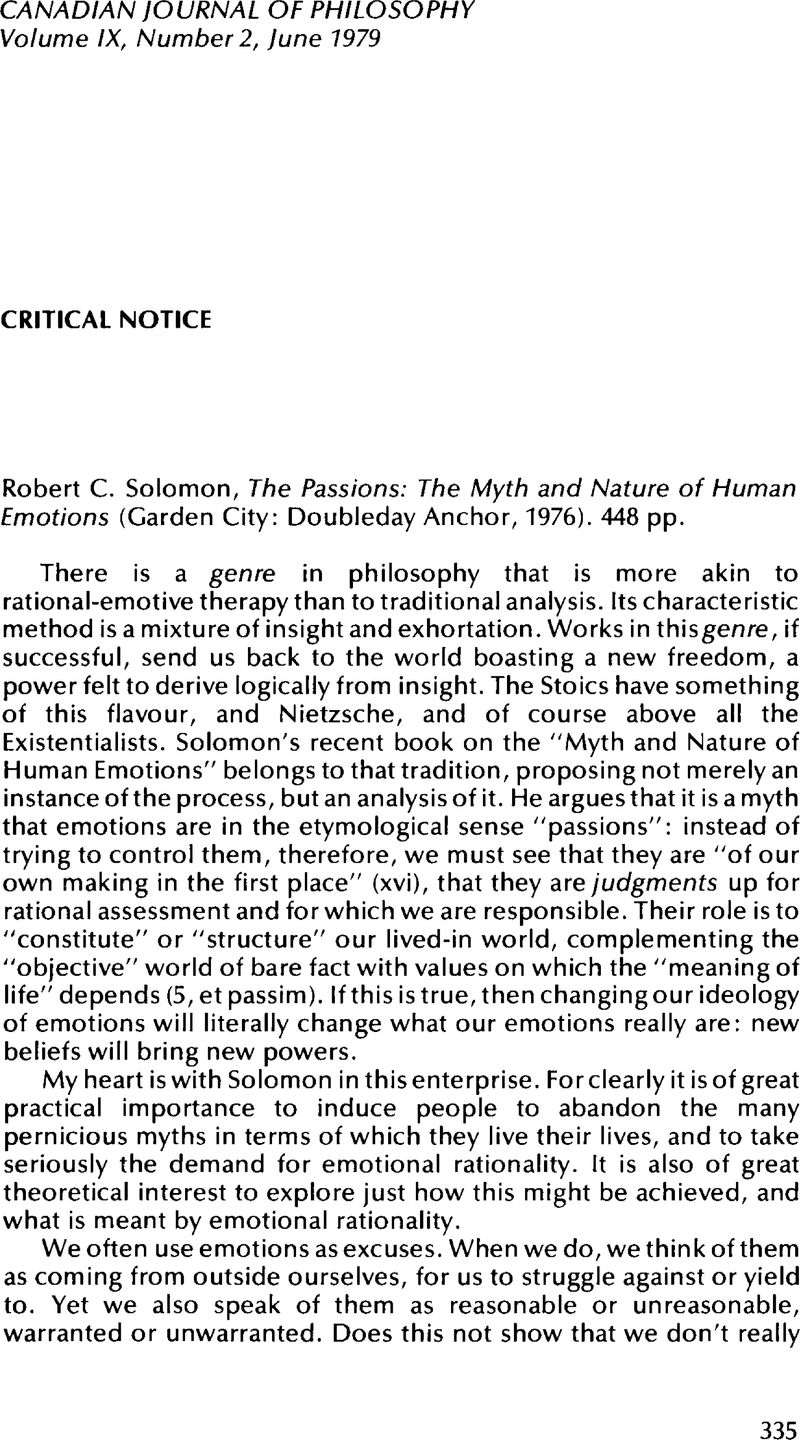No CrossRef data available.
Published online by Cambridge University Press: 01 January 2020

1 For the view that the Desiderative part is capable of rudimentary rationality, Terry Penner, v., “Thought and Desire in Plato”, in Vlastos, G., ed., Essays on Plato II (Garden City: Doubleday Anchor), 1971.Google Scholar
2 With one exception: Joy. V. p. 349 below.
3 Solomon does not offer this consideration as an argument for the present point: he uses it only to show that “an emotion is not distinct or separable from its object” (178). But it is the best argument I can think of for preferring an assimilation to judgment rather than desire.
4 Not excluding Solomon himself: d. “my cat finds her life richly endowed with meanings” (30); and “even a rat has a surreality” (183).
5 McTaggart, j.M.E., The Nature of Existence, vol. 2 (Cambridge University Press, 1927).Google Scholar The relevant passages are available in The Philosophy of Time, ed. Gale, Richard M. (London: MacMillan, 1968). V. pp. 86–97.CrossRefGoogle Scholar
6 “All claims concerning Reality are claims that are universal”. But contrast also these two passages: “Which emotions are basic is not a fact of human nature, but a fact about the surreality of some particular people.” (284); but “However personal an emotion may be, there is no such thing as a unique emotion, one with structures unknown to the rest of us” (254).
7 “Sartre on Emotions”, in Schilpp, P.A. (ed.), Sartre (La Salle, 111.: Open Court, 1977).Google Scholar
8 V. esp. “Instincts and their Vicissitudes,” in the Complete Psychological Works of Freud, ed. Strachey et al., vol. 14. For a more modern continuation of the same research programme, v. for example]. Bowlby, Attachment and Loss. Unfortunately psychoanalytic writings tend not to clarify the distinction between emotion and desire.
9 Piaget, V. J., Biology and Knowledge, Walsh, tr. B. (Chicago, University of Chicago Press, 1971 ).Google Scholar
10 In emphasizing the biological lacuna, I should not be taken to endorse the sociological one, which is equally glaring. Not only are we socialized into most of the emotions we feel, but it is often an integral part of the socialization to persuade us that the emotion is natural. Consider the culturally variable legal category of the crime passionnel.
11 Consider this pronouncement: “There are many reasons to pity a man, but his passions are not among them. What one ‘feels’ is what one chooses and accepts” (23). Could the same really be said of what one knows? Knowledge, by definition, is distinguished from belief by its cause in something external. Yet it would be senseless to retreat to the view that you could be pitied for what you know but not for what you believe.
12 “Differing conceptions of Reality are competitive. But surrealities, because there need be no end to them, are indifferent to any such competitionexcept when a surreality aspires to objective status” (76). What I am arguing is that while recognizing the relativity of perspective, it is not possible for subjectivity not to aspire to objective status in so far as it formulates judgments. For it is analytic that judgments aim at truth.
13 A free paraphrase, not a quotation. For the good Bishop's own words, Robinson, v. j.A., Honest To God; Philadelphia: SCM Press, 1963.Google Scholar
14 Frege, V.G., “The Thought: a Logical Inquiry”, tr. A. and M. Quinton, Mind (1956).Google Scholar
15 As Aristotle pointed out, one should not only show the truth, but also diagnose the cause of falsehood (NE 1154 a22).
16 “Existentialism is a masculine fantasy: action free of history, psychology, the body, earth, blood.“- C. Hosek.